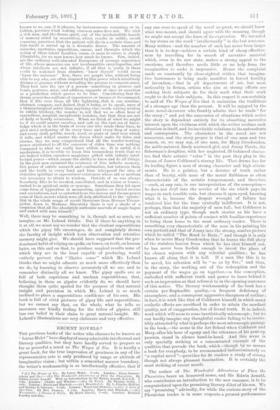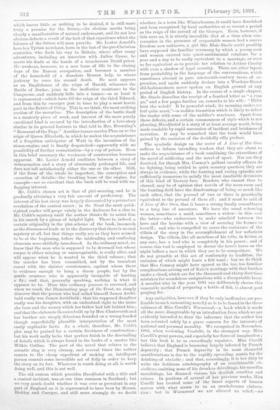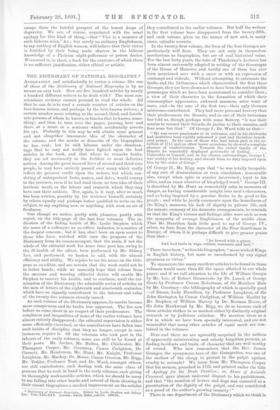RECENT NOVELS.* THE previous books of the writer who chooses
to be known as ‘. Lucas Malet "have displayed many admirable intellectual and literary qualities, but they have hardly served to prepare us for so powerful a novel as The Wages of Sin. It is hardly a great book, for the true impression of greatness in any of the representative arts is only produced by range or altitude of imaginative vision ; but within a somewhat narrow boundary, the writer's workmanship is so intellectually effective, that if * Cl.) The Wanes of Sin. By Lucas Moat. 3 vols. London Swan Sonnen- sehein and Co. 2.) The Wonderful Adventures of Phra the Thionielan. By Edwin Lester Arnold. With an Introduction by Sir Edwin Arnold, K.C.I.E. 3 vols. London Ghetto and Windus.—(3.) On Trust. By Thomas Cobb. 3 vols. London: Hurst and Blachott.—(&) Handfasted. By A. Charles Bickley and George S. Curryer. 8 vols. London Ward and Downey.—(5.) A Line of liur Ount. By Mrs, Conney: 3 vols. London: Hurst and Blackott.—(6.) Wormwood : a Drama of Pam& By Marie Corelli, 3 vols. London: Richard Bentley and Son, any one were to speak of the novel as great, we should know what was meant, and should agree with the meaning, though we might not accept the form of its expression. We intended to lay stress on the word " intellectually " in the last sentence. Many writers—and the number of such has never been larger than it is to-day—achieve a certain kind of cheap effective- ness by travelling far in search of narrative material which, even in its raw state, makes a strong appeal to the emotions, and therefore needs little or no help from the imagination to make it impressive. Hence the complaint made so constantly by clear-sighted critics, that imagina- tive barrenness is being made manifest in forced fertility of invention,— that in all departments of art, but most noticeably in fiction, artists who aim at strong effects are making their subjects do for their work what their work ought to do for their subjects. In. this respect it can certainly be said of The Wages of Sin that it maintains the traditions of a stronger age than the present. It will be enjoyed by the mere novel-devourer who frankly admits that he reads "for the story ; " and yet the succession of situations which makes the story is dependent entirely for its absorbing narrative interest upon the vividness with which,the writer realises each situation in itself, and its inevitable relations to its antecedents and consequents. The characters in the novel are not numerous, and the story proper is that of one man and two women, or, we may say, of one man, for Mary Crookenden, the noble-natured, finely nurtured girl, and Jenny Parris, the fisherman's daughter, with her neglected, ill-balanced charac- ter, find their artistic " value " in the part they play in the drama of James Colthurst's stormy life. That drama has for its leading figure a man of strong character and high attain- ments. He is a painter, but a devotee of truth rather than of beauty, with none of the moral flabbiness so often characteristic of the artistic temperament, and therefore —such, at any rate, is our interpretation of the conception— he does not drIft into the service of the sin which pays its wages in such terrible coin, but chooses it open-eyed, knowing what it is, because the despair wrought of failure has rendered him for the time cynically indifferent. It is not, perhaps, thus that the majority of men fall ; but Colthurst is not an ordinary type, though such stories as his have a sufficient number of points of contact with familiar experience to bring them home to the moat ordinary reader. There is something very characteristic of the man in his painting his own portrait and that of Jenny into the strong, sombre picture which he called "The Road to Ruin ;" and though it is only when he meets Mary Crookenden that he learns the full glory of the stainless heaven from which he has shut himself out, he has never been foolish enough to invest the place of his chosen sojourn with any celestial qualities ; he has known all along that it is hell. If a man. like this is to be saved, his salvation will be "so as by fire ;" and thus, in the story, the working out of the redemption and the payment of the wages go on together,—a, fine conception, embodied with sufficient truth and power to leave behind it such an impression as that referred to in the opening sentences of this notice. The literary workmanship of the book has a certain pre.Rapha,elite quality,—a frequent deficiency of atmosphere, and a consequent aggressive sharpness of outline ; in fact, it is work like that of Colthurst himself, in which many aesthetic effects are sacrificed in order to • attain the mordant quality, not of exaggeration, but of literal truth. It is, indeed, work which will seem to some inartistically microscopic; but we can hardly imagine any thoughtful reader failing to be irresis- tibly attracted by what is perhaps the most microscopic passage in the book,—the scene in the Art School when Colthurst and Mary, after his hour of agony and the utterance of his pent-up passion, stand in silence hand-in-hand. And this scene is only specially striking as a concentrated example of the qualities that pervade the book, which—though by no means a book for everybody, to be recommended indiscriminately as "a capital novel"—provides for fit readers a study of strong though not always pleasant fascination. It is certainly the most striking of recent novels.
The author of The Wonderful Adventures of Phra the Phcenician bears an honoured name, and Sir Edwin Arnold, who contributes an introduction to the new romance, is to be congratulated upon the promising literary debut of his son. We say " promising " advisedly, for while the curious story of the Phcenician trader is in some respects a present performance
which leaves little or nothing to be desired, it is still more truly a promise for the future,—its obvious merits being clearly a manifestation of natural endowment, and its not less obvious defects a result of the lack of that experience which the labours of the future will soon provide. Mr. Lester Arnold's hero is a Tyrian merchant, born in the last of the pre-Christian centuries, who finds his way to Britain, where after many adventures, including an interview with Julius Owsar, he meets his death at the bands of a treacherous Druid priest.
He awakens, however, to a new lease of life in the closing days of the Roman occupation, and becomes a member of the household of a dissolute Roman lady, to whose jealousy be owes his second death. He next appears as an Englishman of the reign of Harold, witnesses the Battle of Senlac, joins in the ineffective resistance to the Conqueror, and suddenly falls into a trance—so at least it is represented—which lasts till the reign of the third Edward, and from this he emerges just in time to play a most heroic part in the Battle of Crecy. This is, we think, the most striking section of the narrative. The description of the battle itself is a masterly piece of work, and interest of the more purely emotional kind is secured by the introduction of a love-story similar in its general features to that told in Mrs. Browning's " Romaunt of the Page." Another trance carries Phra on to the reign of Queen Elizabeth, in which he makes the acquaintance of a forgotten anticipator of Watt in the invention of the steam-engine, and is finally despatched—apparently with no possibility of further resuscitation—by a cup of poison. Even in this brief summary the weakness of construction becomes apparent. Mr. Lester Arnold oscillates between a story of reincarnation and a story of abnormally prolonged life, and does not tell satisfactorily either the one or the other. Still, if the form of the whole be imperfect, the conception and execution of details—the breaking loose of the engine, for example—are so excellent that the book will be read with un- flagging interest.
Mr. Cobb's chosen art is that of plot-weaving, and he is gradually attaining a very fair amount of proficiency. The interest of his last story was largely discounted by a premature revelation of the central secret : in Oa Trust the most quick- sighted reader will grope vainly in the darkness for a clue to Mr. Cobb's mystery until the author thinks fit to assist him in his search by a gleam of helpful light. There is, indeed, a certain originality in the plot-scheme of the book, inasmuch as the dimouement leads us to the discovery that there is no real mystery at all, but that things really are as they have seemed to be at the beginning, before the misleading and confusing elements were skilfully introduced. In the ordinary novel, we know that the man who is supposed to be drowned but whose corpse is either missing or unrecognisable, is really alive, and will appear when he is wanted in the third volume ; that the murder has been committed, not by the truculent rascal with the sinister countenance, against whom there is evidence enough to hang a dozen people, but by the gentle creature who is apparently incapable of hurting a fly ; and that, generally speaking, nothing is what it appears to be. Here this ordinary process is reversed, and when we reach the illuminating page of On Trust, we simply discover that the person who had called himself James Archi- bald really was James Archibald ; that his supposed daughter really was his daughter, with an undoubted right to the name she bore and the money which her father had left behind him ; and that the elaborate theories built up by Mrs. Chatsworth and her brother are simply delusions founded on a wrong-headed though superficially plausible interpretation of the most easily explicable facts. As a whole, therefore, Mr. Cobb's plot may be praised for a certain freshness of construction ; but his work sadly lacks that perfect finish in the dovetailing of details which is always found in the books of a master like Wilkie Collins. The part of the novel that relates to the acrostic ring is very clumsy, and several times the author resorts to the cheap expedient of making an intelligent person commit some incredible act of folly in order to keep the story on its feet. Whatever is worth doing at all, is worth doing well, and this is not well.
The old custom which provides Handfasted with a title and a central incident, was at one time common in Scotland ; but we very much doubt whether it was ever so prevalent in any part of England as it is represented to have been by Messrs. Bickley and Curryer, and still more strongly do we doubt whether, in a town like Winterbourne, it could have flourished and been recognised by local authorities at so recent a period as the reign of the second of the Georges. Even, however, if this were so, it is utterly incredible that at a time when con- versation in. the presence of respectable women had a coarse freedom now unknown, a girl like Elsie Steele could possibly have supposed the familiar ceremony by which a young man and woman entered into quasi-matrimonial relations for a year and a day to be really equivalent to a marriage, or even so far equivalent as to provide her relation to Arthur Crosby with even a shadow of legal security. There are other lapses from probability in the language of the conversations, which sometimes abound in pure nineteenth-century turns of ex- pression, and again suddenly deviate into a Wardour Street old-fashionedness never spoken on English ground at any period of English history. In the course of a single chapter, Mr. Steele describes the receipt of a franked letter as "a rum go," and a few pages further on, remarks to his wife : " Didst hear the weird? It be powerful wind ; its moaning makes me feel quite scart,"—a sudden transition which is likely to infect the reader with some of the saddler's scartness. Apart from these defects, and a certain commonness of style which is not pleasing, Handfasted is a story of at least average merit, being made readable by rapid succession of incident and briskness of narration. It may be remarked that the book would have gained by the omission of the decidedly silly preface.
The symbolic design on the cover of A Line of Her Own suffices to inform intending readers that they are about to make the acquaintance of a book combining the attractions of the novel of soldiering and the novel of sport. Nor are they deceived, for though Mrs. Conney's gallant cavalry officers do no fighting, being settled in quiet country quarters-,`they are always in evidence, while the hunting and racing episodes are sufficiently numerous to satisfy the most insatiable devourers of this kind of literary fare. Readers who cannot thus be classed, may be of opinion that novels of the mess-room and the hunting-field have the disadvantage of being so much like each other, that the perusal of two or three is practically equivalent to the perusal of them all; and it must be said of A Line of Her Own, that it bears a strong family resemblance to a long line of ancestors. We have the usual scheming woman, sometimes a maid, sometimes a widow—in this case the latter—who endeavours to make miechief between the hero and the heroine with a view of securing the former to herself ; and who is compelled to crave the assistance of the villain of the story in the accomplishment of her nefarious design. The villain, like all members of his tribe, in fiction at any rate, has a tool who is completely in his power; and of couree this tool is employed to doctor the hero's horse on the night before a race in which they are to be competitors. We do not grumble at this act of conformity to tradition, the omission of which might leave a felt want ; but we do think that Mrs. Conney might have spared us the too, too familiar complications arising out of Kate's meetings with that brother under a cloud, which are for the thousand-and-thirty-first time mistaken for scandalous assignations with a disreputable lover. A novelist who in the year 1891 can deliberately choose this venerable method of preparing a kettle of fish, is almost past praying for.
Any antiquities, however, if they be only inoffensive, are pre- ferable to such nauseating novelty as is to be found in the three volumes of Miss Corelli's Woramood,—a book which is made all the more disagreeable by an introduction from which we are evidently intended to draw the inference that the author has been actuated solely by a grave concern for the interests of national and personal morality. We recognised in November, 1886, when reviewing Vendetta, in the strongest way, Miss Corelli's great powers, and especially her force of imagination ; but this book is to us exceedingly repulsive. Miss Gorda believes that England is becoming largely infected by French depravity; that French depravity in its most shameful manifestations is clue to the rapidly spreading mania for the drinking of absinthe ; and that, accordingly, it is her duty to write the fictitious autobiography of an irreclaimable ab- sintheur, omitting none of his drunken drivellings, his maudlin moralisings, his diseased visions, his devilish cruelties and crimes. In portions of several of her previous works, Miss Corelli has treated some of the baser aspects of human nature with what seems to us an unwholesome elabora- tion ; but in Wormwood we are allowed no relief,—no
escape from the hateful prospect of the lowest deeps of depravity. We are, of course, acquainted with the usual apology for this kind of thing,—that "Vice is a monster of such hideous mien," &c. ; but surely no ordinary Englishmen, to say nothing of English women, will believe that their virtue is fortified by their being made sharers in the hideous knowledge of a Parisian night-policeman or prison doctor. Wormwood is, in short, a book for the existence of which there is no sufficient justification, either ethical or artistic.








































 Previous page
Previous page